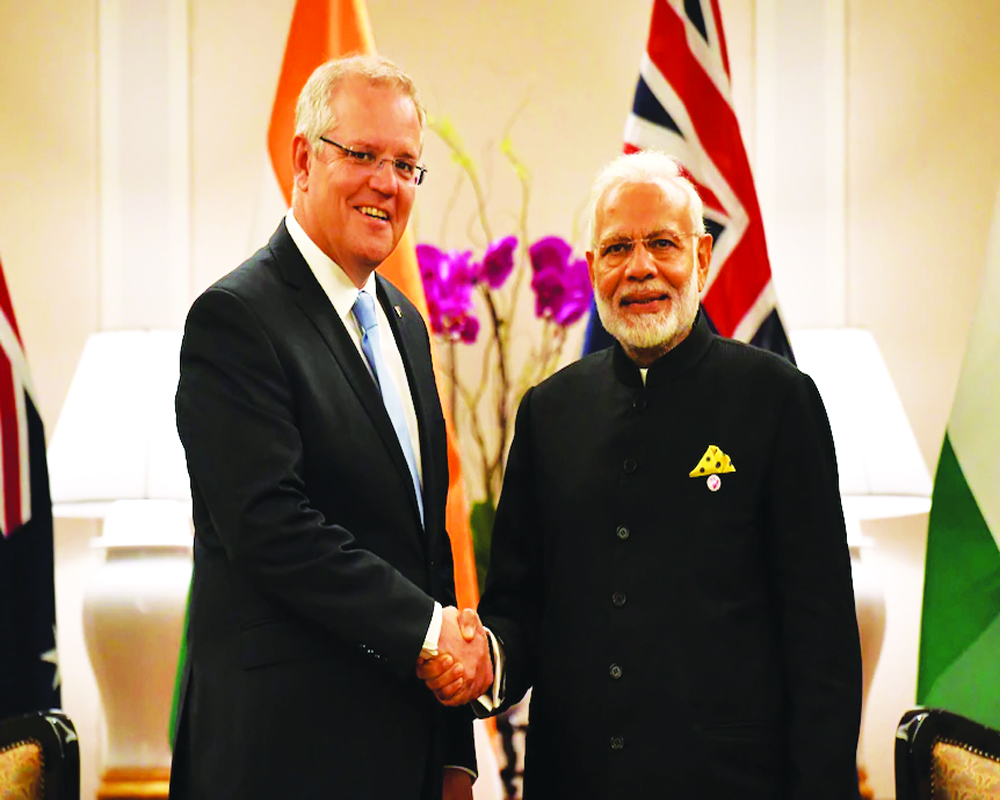In the post-COVID order, the US alone may be unable to guarantee international peace and security, and India and Australia have to step in
The inaugural Australia India 2+2 Ministerial Dialogue between the Australian Defence Minister Peter Dutton, Foreign Minister Marise Payne and their Indian counterparts Rajnath Singh and S Jaishankar was held when the constellation of bilateral and strategic determinants could not have been more favourably placed. Bilateral ties, elevated to Comprehensive Strategic Partnership in June 2020, have reached a historical high, emerged as an important cog in the rapidly evolving world hierarchy, as Jaishankar once argued.
New Delhi and Canberra have hitched on to the tide that propels bilateral, trilateral and quadrilateral engagements.
The Australian Department of Foreign Affairs and Trade (DFAT) has initiated a timely and well-advised review of the Peter Varghese's report, 2018, An India Economic Strategy to 2035, in the context of altered international diplomatic and economic settings. There was a need to recalibrate bilateral trade strategies and diplomatic engagements. On the other hand, India's Australia Economic Strategy authored by Anil Wadhwa has been launched at the right time.
The two reports together are critical for realigning business and trade strategies amid rising bilateral tensions with China and in sync with Australian Senator Simon Birmingham who said, "Australia must look into alternative markets in the European Union and India".
There is no denying that bilateral bonhomie has been driven by COVID-19's impact and Australia's growing tensions with China over the treatment of Uighur Muslims in Xinjiang, Hong Kong crackdown, alleged foreign interference in Australia's internal political functioning, tariff wars and impact of the pandemic on the one hand, and India's troubled ties with China, especially military conflict in Doklam and Ladakh, on the other. Senator Marise Payne has been a vociferous critic of China, and Member of Parliament Peter Dutton unsparing in accusing China for cyber-attacks on Australia. Jaishankar has reiterated that ties are independent of their respective relationships with China, and both sides have dismissed Quad as a future "Asian NATO".
Both the US-India and India-Australia ties are seen as "natural" partnerships, for upholding democracy,respect for territorial sovereignty and unrestrained access to global common goods.
Quad's evolution as a rising ''concert of democracies", which Australia has described as an "anchor of peace and stability in the region" has bolstered bilateral understanding. The 2+2 joint press statement reaffirms this realization, while anchoring the defence ties on three Cs - comfort (of the bilateral relationship in strategic and security spheres), convergence (over security matters) and commitment (to free, open and rules-based Indo-Pacific).The re-entry of Australia in the Malabar exercise and the Mutual Logistical Support Agreement are two key developments denoting fresh thinking in not only New Delhi and Canberra, but also in Washington and Tokyo on the Indo-Pacific.
At a trilateral front, India's 'Act East' policy, Australia's 'Pacific Step-up' and Indonesia's 'Global Maritime Fulcrum' (GMF) complement one another. India employs to elevate its Act East policybased on commerce, culture and connectivity, in sync with the seven-point Indo-Pacific Vision that PM Modi articulated at the Shangri-La Dialogue in 2018, and vision SAGAR (Security and Growth for all in the Region). Act East policy complements Australia's 2018 Pacific-Step Up too in addressing challenges related to states' sovereignty and regional stability, security and prosperity. Similarly, Indonesia's 2014 GMF affirms Indonesia's vital interests as an archipelagic state at the crossroads of contending major power interests. The GMF prioritized the strengthening of the regional architecture to prevent the hegemony of major powers and promote comprehensive maritime cooperation in the Indian Ocean, including the Indian Ocean Rim Association. Similarly, the Australia-Japan-India and the India-France-Australia trilateralsalso adhere to the Quad-based commitments.
In sum, while Australia and India ties turned a new leaf in the early 2000s, what has changed in 20 years is a growing convergence of bilateral and strategic interests and a realisation that in the evolving post-Covid-19 order,the US alone may not be able to guarantee international peace and security, for which they will have to step-up their desired roles.
(The writer is the CEO, Institute for Australia India Engagement and Editor-in-Chief, India News Australia. The views expressed are personal.)


























